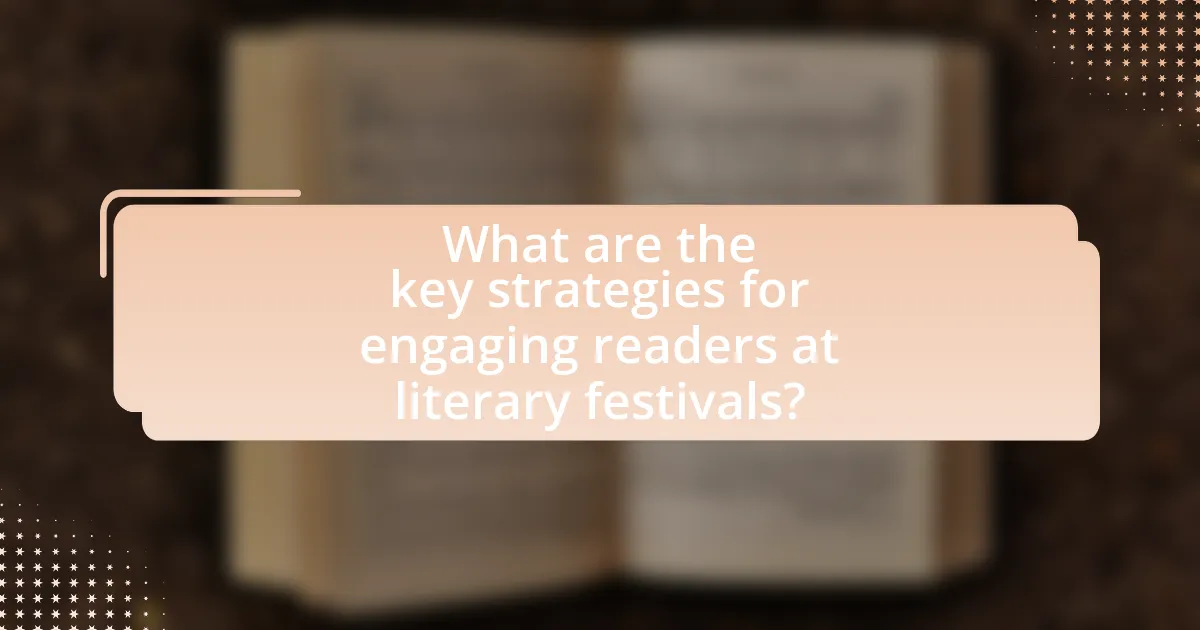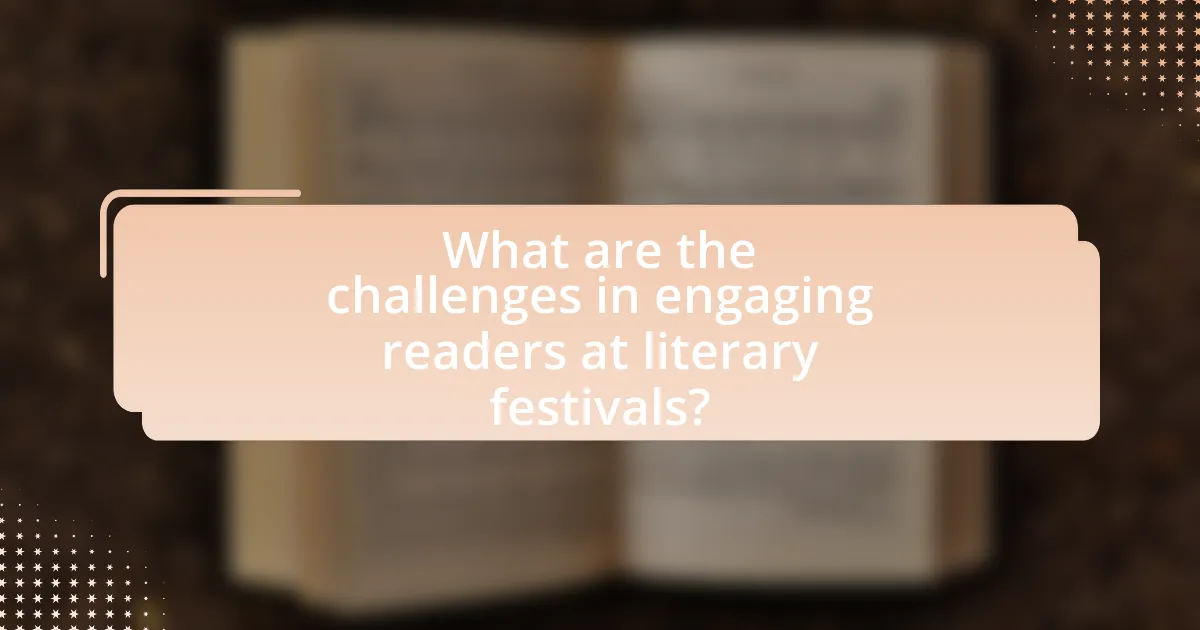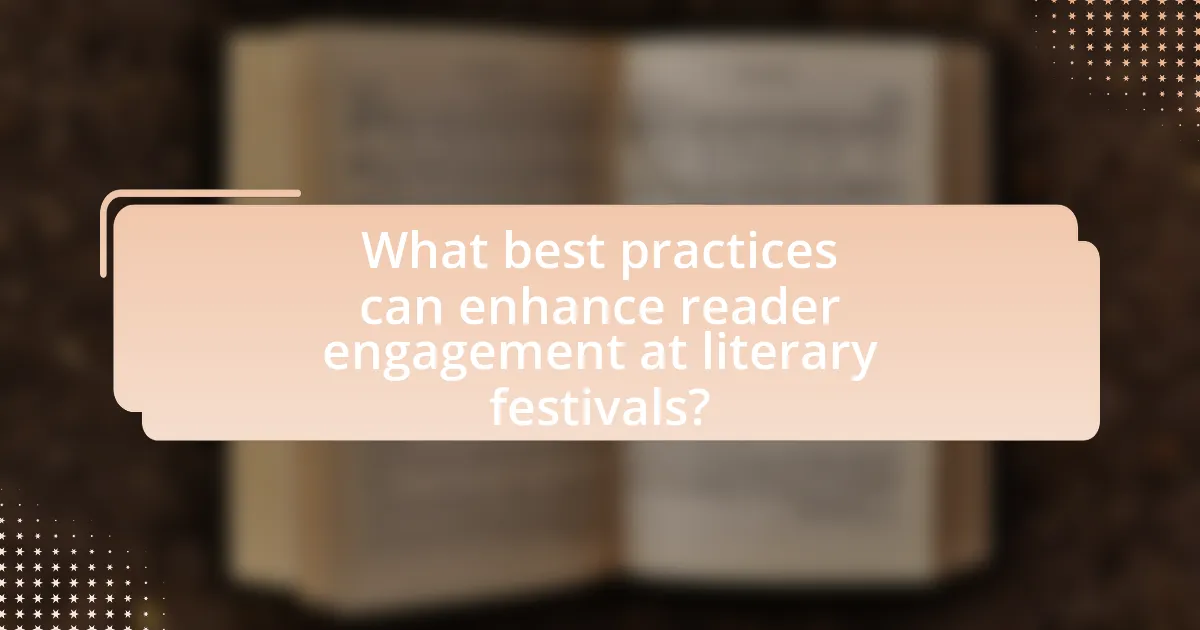The article focuses on strategies for engaging readers at literary festivals, highlighting key methods such as interactive sessions, author signings, and themed discussions. It emphasizes the importance of personal storytelling and audience participation in fostering connections between authors and attendees. Additionally, the article addresses the role of workshops and panels in enhancing reader engagement, as well as the impact of marketing strategies and social media on participation. Challenges faced in reader engagement, including logistical issues and market saturation, are also discussed, along with best practices for authors to improve their interactions with audiences.

What are the key strategies for engaging readers at literary festivals?
Key strategies for engaging readers at literary festivals include interactive sessions, author signings, and themed discussions. Interactive sessions, such as workshops or Q&A panels, allow readers to participate actively, fostering a sense of community and connection with authors. Author signings provide personal interaction, making readers feel valued and enhancing their experience. Themed discussions, focusing on specific genres or topics, attract targeted audiences and stimulate deeper conversations, which can lead to increased interest in the authors’ works. These strategies have been shown to enhance reader engagement and satisfaction at literary events.
How can authors effectively connect with their audience during events?
Authors can effectively connect with their audience during events by engaging in interactive discussions and personal storytelling. Interactive discussions allow authors to respond to audience questions in real-time, fostering a sense of community and involvement. Personal storytelling creates an emotional connection, as sharing personal experiences related to their writing can resonate with attendees. Research indicates that events featuring Q&A sessions and personal anecdotes lead to higher audience satisfaction and retention, as seen in studies conducted at various literary festivals where audience engagement metrics were significantly improved.
What techniques can authors use to create memorable interactions?
Authors can create memorable interactions by employing techniques such as storytelling, active audience participation, and personalized engagement. Storytelling captivates audiences by weaving narratives that resonate emotionally, making the interaction more impactful. Active audience participation, such as Q&A sessions or live polls, fosters a sense of involvement and connection, enhancing the overall experience. Personalized engagement, where authors address audience members by name or reference their interests, creates a unique and memorable atmosphere. These techniques are supported by research indicating that emotional connections and active involvement significantly enhance memory retention and engagement in literary contexts.
How does personal storytelling enhance reader engagement?
Personal storytelling enhances reader engagement by creating emotional connections that resonate with the audience. When authors share personal experiences, they evoke empathy and relatability, making the narrative more compelling. Research indicates that stories that include personal elements can increase retention and understanding; for instance, a study published in the journal “Psychological Science” found that narratives with emotional content are remembered better than factual information alone. This emotional engagement encourages readers to invest more in the story, fostering a deeper connection with the author and the material presented.
What role do workshops and panels play in reader engagement?
Workshops and panels significantly enhance reader engagement by providing interactive and informative experiences that foster a deeper connection with literature. These formats allow readers to participate actively, ask questions, and engage directly with authors and experts, which can lead to a more profound understanding and appreciation of the material. Research indicates that events featuring author discussions and hands-on workshops can increase audience retention and satisfaction, as they create opportunities for personal interaction and community building among attendees.
How can interactive workshops foster a deeper connection with readers?
Interactive workshops foster a deeper connection with readers by actively engaging them in the creative process, allowing for personal expression and collaboration. This hands-on approach encourages participants to share their thoughts and experiences, creating a sense of community and belonging among readers. Research indicates that interactive learning environments enhance retention and understanding, as evidenced by a study published in the Journal of Educational Psychology, which found that students in interactive settings demonstrated higher levels of engagement and satisfaction compared to traditional formats. By facilitating dialogue and feedback, interactive workshops not only deepen readers’ emotional investment in the material but also enhance their overall literary experience.
What types of panel discussions are most effective for engaging audiences?
Interactive panel discussions are the most effective for engaging audiences. These discussions encourage audience participation through Q&A sessions, live polling, and social media integration, which fosters a dynamic exchange of ideas. Research indicates that interactive formats can increase audience retention and satisfaction, as seen in studies conducted at literary festivals where audience engagement metrics improved significantly when interactive elements were included.
How can marketing strategies enhance reader participation at festivals?
Marketing strategies can enhance reader participation at festivals by creating targeted campaigns that resonate with specific audience segments. For instance, utilizing social media platforms to promote festival events can increase visibility and engagement, as studies show that 54% of social media users are more likely to attend events they see promoted online. Additionally, offering incentives such as early bird ticket discounts or exclusive access to author signings can motivate readers to participate. Research indicates that personalized marketing, such as tailored email invitations based on previous attendance, can significantly boost engagement rates, leading to higher turnout at literary festivals.
What promotional tactics can attract more attendees to literary events?
Promotional tactics that can attract more attendees to literary events include targeted social media advertising, partnerships with local businesses, and engaging content marketing. Targeted social media advertising allows event organizers to reach specific demographics interested in literature, increasing visibility and interest. Partnerships with local businesses can provide mutual benefits, such as cross-promotion and discounts for attendees, which can enhance community engagement. Engaging content marketing, such as blog posts, interviews with authors, and interactive online events, can create buzz and anticipation around the literary event, drawing in a larger audience. These tactics have been shown to effectively increase attendance by leveraging community connections and digital platforms to reach potential attendees.
How does social media influence reader engagement before and during festivals?
Social media significantly enhances reader engagement before and during festivals by facilitating real-time interaction and information sharing. Platforms like Twitter and Instagram allow organizers and authors to promote events, share schedules, and create buzz through hashtags, which can lead to increased attendance and participation. For instance, a study by the Pew Research Center found that 69% of adults in the U.S. use social media, indicating a broad audience reach. Additionally, during festivals, live updates and audience interactions on social media can create a sense of community and immediacy, encouraging attendees to engage with content and each other. This dynamic interaction fosters a more immersive experience, as evidenced by events that report higher engagement metrics when actively utilizing social media channels.

What are the challenges in engaging readers at literary festivals?
Engaging readers at literary festivals faces several challenges, primarily due to competition for attention, diverse audience interests, and logistical constraints. The competition for attention arises from numerous events occurring simultaneously, making it difficult for any single session to attract a significant audience. Additionally, the diverse interests of attendees can lead to fragmented engagement, as not all readers will resonate with every author or genre presented. Logistical constraints, such as scheduling conflicts and venue limitations, further complicate efforts to create an inclusive and engaging atmosphere. These factors collectively hinder the ability to foster meaningful connections between authors and readers at literary festivals.
What common obstacles do authors face when trying to connect with readers?
Authors commonly face obstacles such as limited visibility, audience engagement challenges, and the saturation of the market when trying to connect with readers. Limited visibility arises from the vast number of books published annually, making it difficult for individual authors to stand out. Audience engagement challenges occur when authors struggle to create meaningful interactions with readers, often due to a lack of effective communication strategies or understanding of their audience’s preferences. Market saturation complicates the situation further, as readers have countless options, leading to difficulty in capturing their attention. These factors collectively hinder authors’ efforts to establish a strong connection with their audience.
How can authors overcome shyness or stage fright during events?
Authors can overcome shyness or stage fright during events by practicing public speaking techniques and engaging in thorough preparation. Techniques such as deep breathing, visualization, and positive affirmations can help reduce anxiety. Research indicates that rehearsing in front of a mirror or with friends can build confidence and familiarity with the material. Additionally, understanding the audience and focusing on the message rather than personal fears can shift attention away from self-consciousness. Studies show that authors who engage in these strategies report lower anxiety levels and improved performance during public appearances.
What strategies can be employed to engage a diverse audience?
To engage a diverse audience, organizers can implement inclusive programming that reflects various cultural perspectives and interests. This can include featuring authors from different backgrounds, offering multilingual sessions, and incorporating diverse genres and themes that resonate with various demographic groups. Research indicates that events with diverse representation attract broader audiences; for instance, a study by the National Endowment for the Arts found that diverse programming increases attendance and engagement by appealing to a wider range of cultural identities.
How do logistical issues impact reader engagement at festivals?
Logistical issues significantly hinder reader engagement at festivals by creating barriers to access and participation. For instance, inadequate transportation options can limit attendees’ ability to reach the venue, while poor scheduling may lead to overlapping events, causing potential participants to miss out on desired sessions. A study by the National Endowment for the Arts found that logistical challenges, such as long wait times and insufficient seating, directly correlate with decreased audience satisfaction and engagement levels. These factors illustrate how logistical shortcomings can detract from the overall experience, ultimately affecting the festival’s success in fostering reader interaction and enthusiasm.
What are the effects of scheduling conflicts on audience attendance?
Scheduling conflicts significantly reduce audience attendance at events. When multiple events occur simultaneously, potential attendees often have to choose between them, leading to lower turnout for each individual event. Research indicates that events with overlapping schedules can see attendance drop by as much as 30% compared to those scheduled at different times. This phenomenon is particularly evident in literary festivals, where competing sessions or activities can divert interest and participation, ultimately impacting the overall success and engagement levels of the festival.
How can venue selection influence reader participation?
Venue selection significantly influences reader participation by affecting accessibility, atmosphere, and engagement opportunities. A well-chosen venue, such as a local library or community center, enhances accessibility for diverse audiences, encouraging higher attendance. For instance, a study by the National Endowment for the Arts found that events held in familiar, community-oriented spaces attract more participants compared to those in isolated or less accessible locations. Additionally, the atmosphere created by the venue can enhance the overall experience, making readers feel more comfortable and engaged. Venues that offer interactive spaces or comfortable seating arrangements foster a sense of community, which can lead to increased participation. Thus, strategic venue selection is crucial for maximizing reader involvement at literary festivals.

What best practices can enhance reader engagement at literary festivals?
To enhance reader engagement at literary festivals, organizers should implement interactive sessions, such as workshops and Q&A panels, which actively involve attendees. Research indicates that interactive formats increase participant satisfaction and retention of information, as seen in the 2019 study by the National Endowment for the Arts, which found that audiences are more likely to engage with content when they can participate directly. Additionally, utilizing social media platforms to create buzz and facilitate discussions before, during, and after the event can significantly boost engagement levels, as evidenced by a 2020 survey from Eventbrite, which reported that 70% of attendees felt more connected to events that had an active online presence.
How can authors prepare for successful interactions with readers?
Authors can prepare for successful interactions with readers by actively engaging in audience research and practicing effective communication skills. Understanding the demographics and interests of their audience allows authors to tailor their presentations and discussions, making them more relevant and engaging. Additionally, practicing clear and confident communication helps authors convey their messages effectively, fostering a positive connection with readers. Research indicates that authors who engage with their audience through Q&A sessions and personalized interactions enhance reader satisfaction and loyalty, as seen in studies conducted at various literary festivals.
What are effective ways to promote upcoming events to maximize attendance?
Effective ways to promote upcoming events to maximize attendance include utilizing social media platforms, email marketing, and partnerships with local organizations. Social media allows for targeted advertising and engagement with potential attendees, as platforms like Facebook and Instagram have proven to increase event visibility; for instance, a study by Eventbrite found that 93% of event creators use social media to promote their events. Email marketing can effectively reach an established audience, with a report from Mailchimp indicating that email campaigns can yield an average open rate of 21.33% for event promotions. Collaborating with local organizations can expand reach and credibility, as partnerships often lead to shared audiences and resources, enhancing overall attendance.
How can authors utilize feedback to improve future engagements?
Authors can utilize feedback by systematically analyzing audience responses to their presentations and interactions. This analysis allows authors to identify strengths and weaknesses in their engagement strategies. For instance, if feedback indicates that readers enjoyed interactive elements, authors can incorporate more of these in future events. Additionally, authors can use specific metrics, such as audience engagement scores or post-event surveys, to quantify the effectiveness of their approaches. Research shows that authors who adapt their strategies based on feedback can increase audience satisfaction and participation, leading to more successful future engagements.
What innovative approaches can be adopted for reader engagement?
Innovative approaches for reader engagement include interactive workshops, live readings with audience participation, and the use of technology such as augmented reality experiences. Interactive workshops allow readers to actively participate in the creative process, enhancing their connection to the material. Live readings that invite audience members to contribute or ask questions foster a dynamic dialogue between authors and readers, making the experience more immersive. Additionally, incorporating augmented reality can create unique, multi-sensory experiences that captivate attendees, as evidenced by events like the 2022 Edinburgh International Book Festival, which utilized AR to bring stories to life, significantly increasing audience interaction and satisfaction.
How can technology be leveraged to enhance the festival experience?
Technology can be leveraged to enhance the festival experience by utilizing mobile applications that provide real-time updates, schedules, and interactive maps. These applications can facilitate attendee engagement through features like live polling, Q&A sessions, and social media integration, allowing participants to connect with authors and fellow attendees. For instance, the use of augmented reality can create immersive experiences, such as virtual book signings or interactive storytelling sessions, which have been shown to increase attendee satisfaction and participation. Additionally, data analytics can help organizers understand attendee preferences and improve future events, as evidenced by studies indicating that personalized experiences lead to higher engagement levels at festivals.
What unique activities can be introduced to captivate readers?
Unique activities that can be introduced to captivate readers at literary festivals include interactive workshops, live readings with audience participation, and immersive storytelling experiences. Interactive workshops allow attendees to engage directly with authors and learn about writing techniques, fostering a deeper connection to the literary process. Live readings with audience participation can enhance the experience by inviting attendees to read excerpts or share their interpretations, creating a communal atmosphere. Immersive storytelling experiences, such as escape rooms themed around popular books or augmented reality installations, can transport readers into the narrative world, making literature more engaging and memorable. These activities not only entertain but also encourage active participation, which has been shown to increase retention and enjoyment of literary content.
What practical tips can authors follow to engage readers effectively?
Authors can engage readers effectively by utilizing interactive elements during their presentations. Incorporating Q&A sessions allows readers to ask questions, fostering a dialogue that enhances connection. Additionally, using storytelling techniques can captivate the audience, as research shows that narratives are more memorable than facts alone. Engaging readers through social media before and after events can also build anticipation and maintain interest, as studies indicate that authors who interact with their audience online see increased engagement during live events.